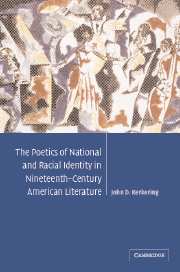Book contents
- Frontmatter
- Contents
- List of illustrations
- Acknowledgments
- List of abbreviations
- Introduction: the poetics of identity
- PART I THE POETICS OF NATIONAL IDENTITY
- PART II THE POETICS OF RACIAL IDENTITY
- 3 “Of me and of mine”: the music of racial identity
- 4 “Blood will tell”: literary effects and the diagnosis of racial instinct
- Conclusion: the conservation of identities
- Notes
- Bibliography
- Index
3 - “Of me and of mine”: the music of racial identity
Published online by Cambridge University Press: 22 September 2009
- Frontmatter
- Contents
- List of illustrations
- Acknowledgments
- List of abbreviations
- Introduction: the poetics of identity
- PART I THE POETICS OF NATIONAL IDENTITY
- PART II THE POETICS OF RACIAL IDENTITY
- 3 “Of me and of mine”: the music of racial identity
- 4 “Blood will tell”: literary effects and the diagnosis of racial instinct
- Conclusion: the conservation of identities
- Notes
- Bibliography
- Index
Summary
With Reconstruction entering its tenth year in 1875, plans were underway in Philadelphia for a gala event to mark the following year's national centennial. Opening ceremonies would feature a choral cantata with music by Northerner Dudley Buck and words by Southerner and former Confederate soldier and poet Sidney Lanier (see Figure 3.1.). This collaboration between North and South was intended to symbolize the national unity that Reconstruction had so far failed to restore. Lanier's poem “The Centennial Meditation of Columbia” asserts national continuity by personifying America as a single entity, the goddess Columbia, whose declaration “I was: I am: and I shall be” asserts a national will to endure. Lanier was not the only poet, however, to mark the centennial, for Walt Whitman's 1876 “Preface” also references “the Centennial at Philadelphia,” describing Leaves of Grass as “my contribution and outpouring to celebrate … the first Centennial of our New World Nationality.” Both Lanier and Whitman, then, seize the centennial moment to look beyond civil war toward national unity.
In doing so, however, each poet provides a different account of the nation's history. Whitman invokes the Revolution of 1776 to celebrate a “New World Nationality” that coincides with “the Hundred Years' life of the Republic” (LG, 751). Figuring the Revolution as a national birth, he asserts: “[A]ll the hitherto experience of The States, their first Century, has been but preparation, adolescence – and … This Union is only now and henceforth (i.e. since the Secession war) to enter on its full Democratic career” (LG, 750).
- Type
- Chapter
- Information
- The Poetics of National and Racial Identity in Nineteenth-Century American Literature , pp. 113 - 151Publisher: Cambridge University PressPrint publication year: 2003



